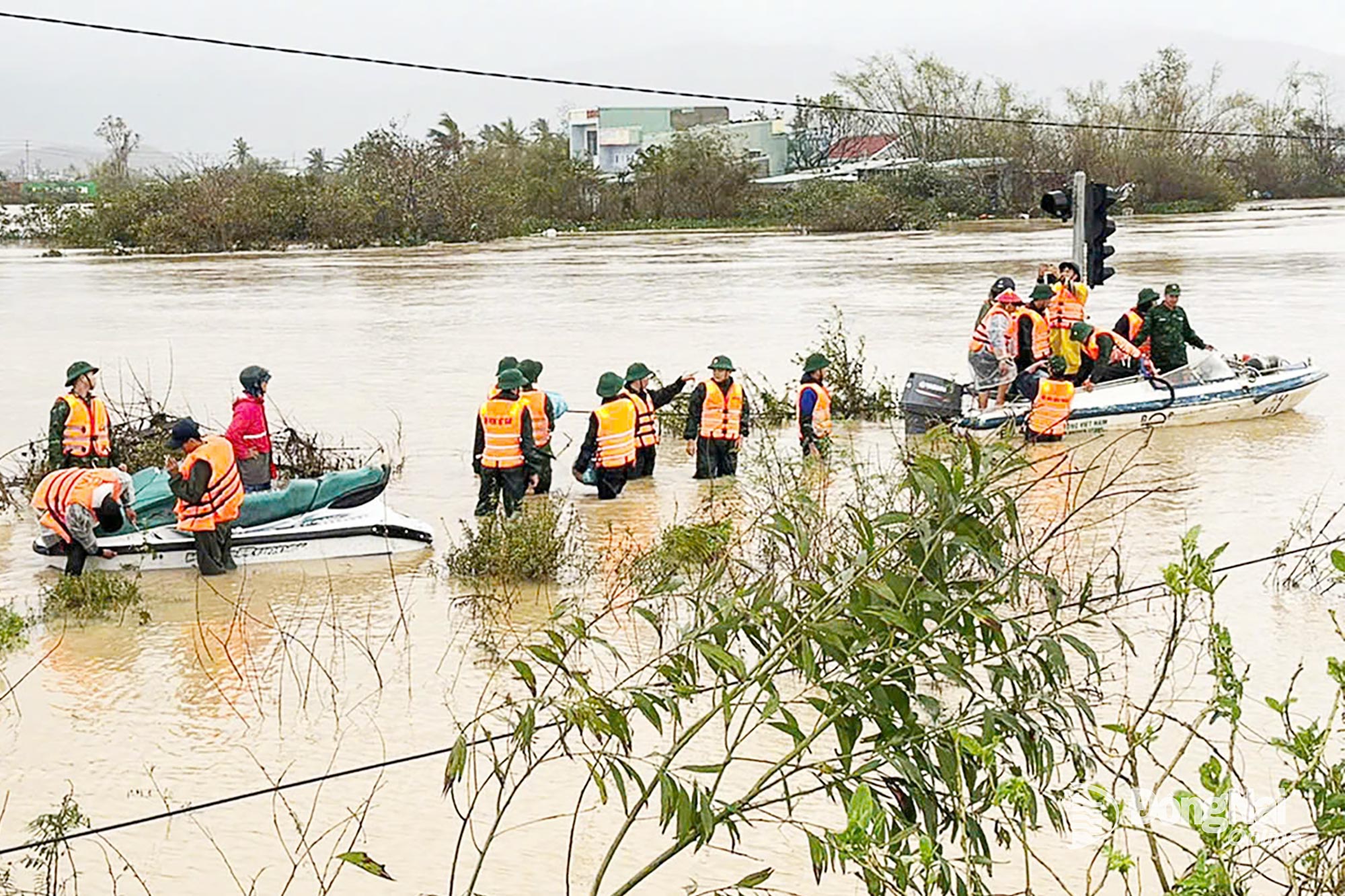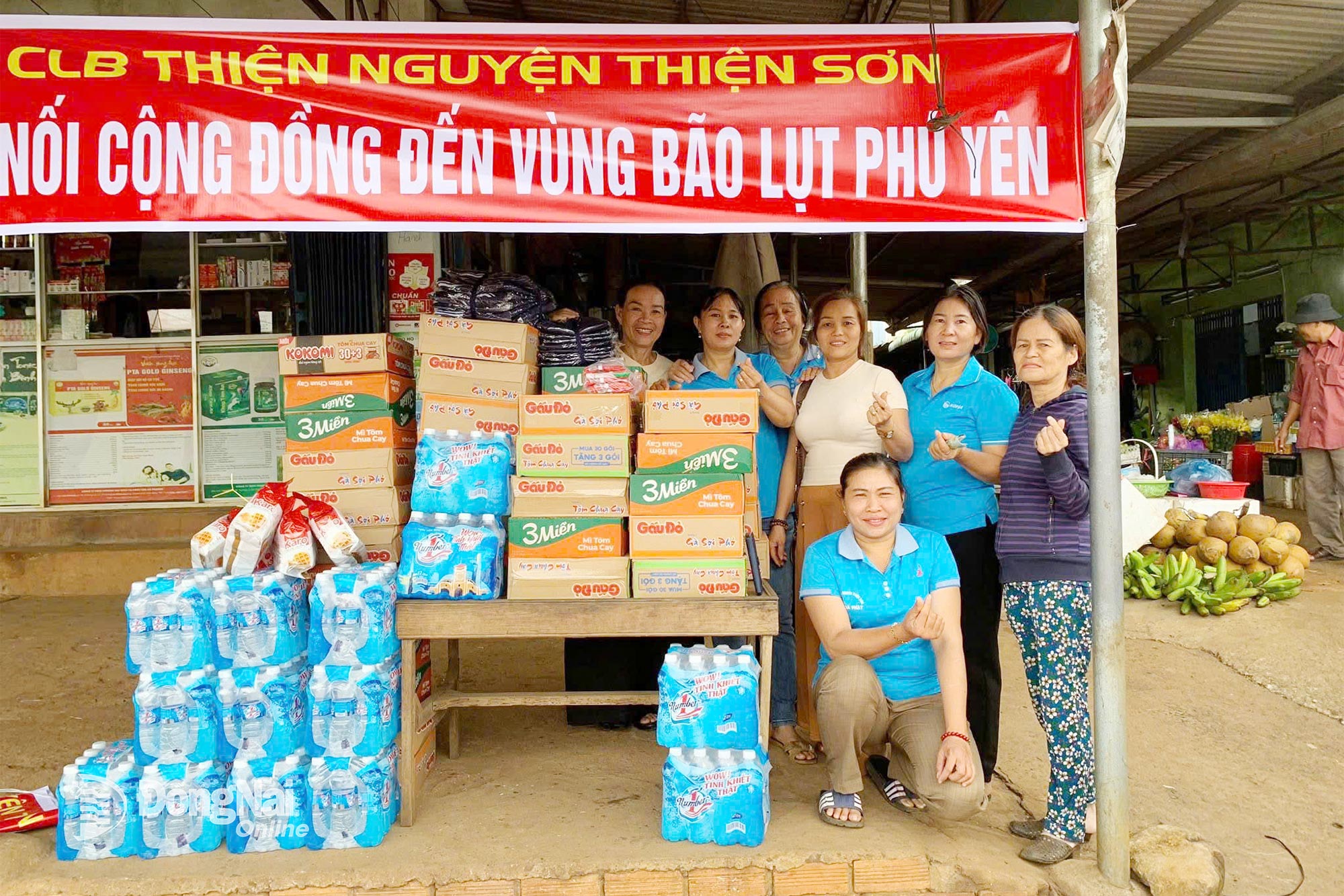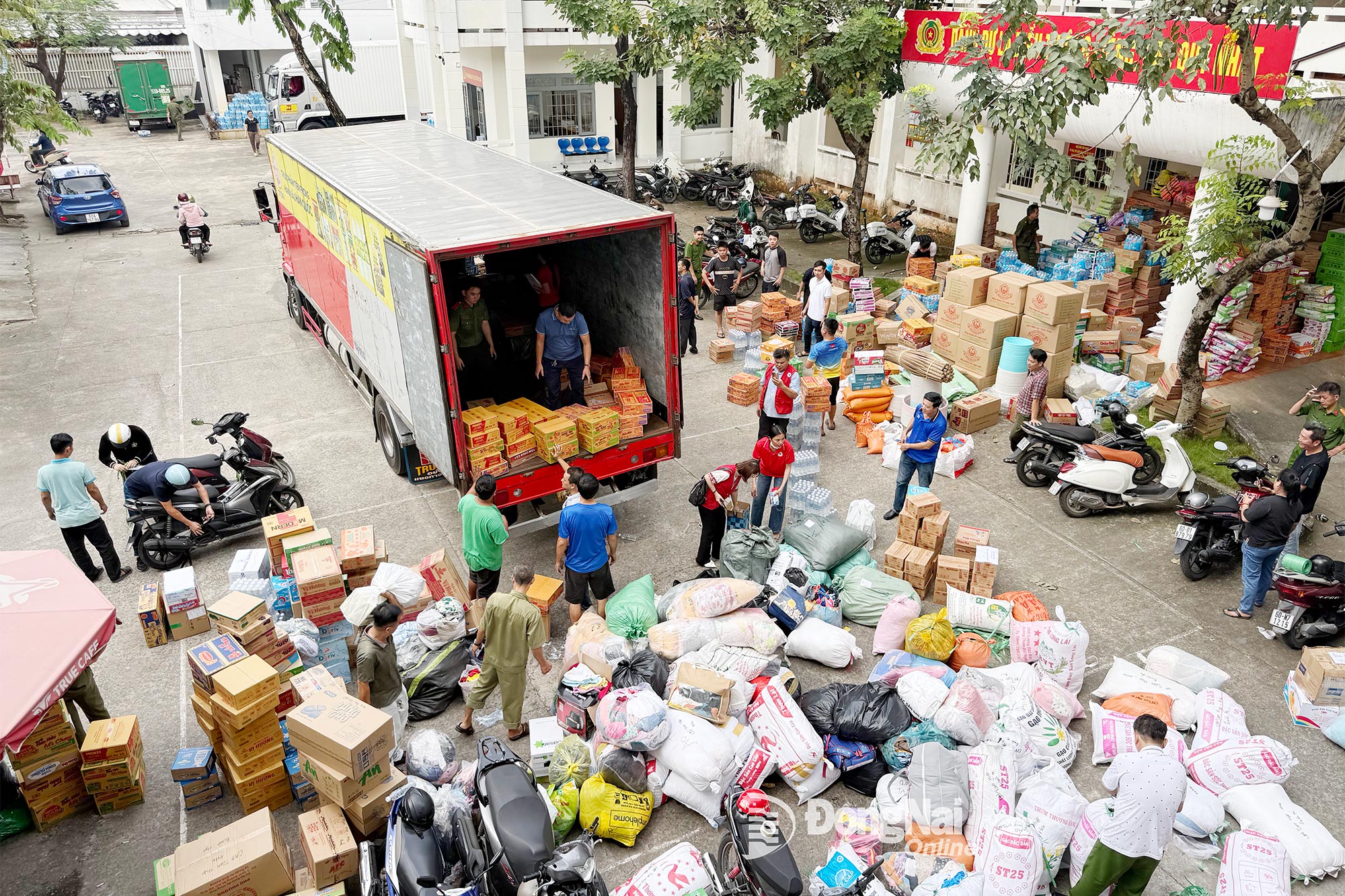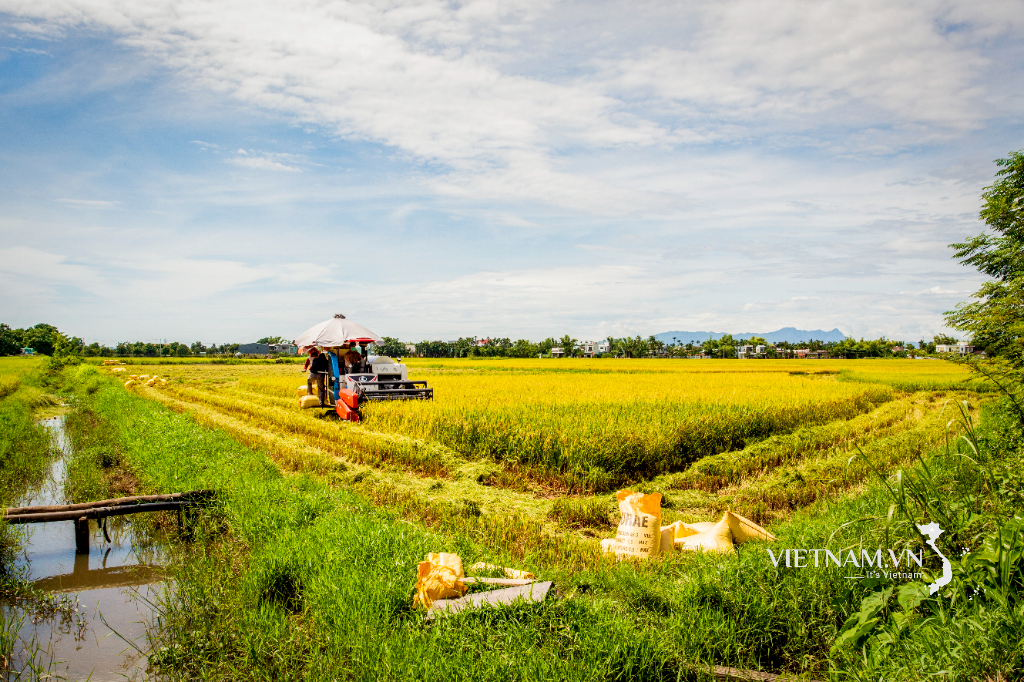 |
| Police in Dak Lak province rescued a family with young children and elderly people in Tay Hoa commune. Photo: Minh Anh. |
Central Vietnam is already accustomed to heavy rains and storms, but this time the floods exceeded all predictions. In many places, water rose rapidly within hours, sweeping away houses, fields, and livestock; cutting off transportation and making rescue efforts extremely difficult.
On this narrow and vulnerable strip of land, each time a storm or flood passes, old wounds haven't even healed before new ones are inflicted. In the Central Highlands, provinces like Gia Lai and Lam Dong have also been severely affected. Prolonged torrential rains have caused continuous landslides, sweeping away hundreds of houses and destroying thousands of hectares of crops, coffee, and pepper – the main source of livelihood for the local people. Many villages have been isolated, lacking food, clean water, and medicine.
Floods not only swept away property, but also brought irreparable grief and loss. The tears of mothers who lost their children, wives who lost their husbands, and orphaned children left alone in an instant, have broken the hearts of the entire nation.
When storms and floods test the resilience and humanity of the Vietnamese people.
In the midst of suffering, what warms our hearts are the images of human kindness. Police, military, and militia forces work tirelessly day and night to rescue victims; relief trucks rush to the scene; makeshift kitchens steam amidst the floodwaters; homes open their doors to strangers seeking shelter… All of this reflects the age-old tradition of national solidarity.
In major cities, numerous volunteer groups, social organizations, associations, businesses, and individuals immediately launched fundraising campaigns. A packet of instant noodles, a few sets of clothes, a box of water, a warm blanket, or even just a few tens of thousands of dong from struggling workers… all are becoming a lifeline for flood victims to stay strong.
This spirit is not new. It has become the identity of the Vietnamese people – a small but indomitable nation; struggling but compassionate; poor but always knowing how to share. Whenever natural disasters strike, the people of the whole country become like one big family: some contribute labor, some contribute resources, some offer words of encouragement, all turning their attention to the most affected areas.
The devastating floods not only tested compassion but also demanded a more coordinated, swift, and professional response from the entire political system. First and foremost, emergency relief efforts needed to be implemented more quickly and accurately, with maximum mobilization of state resources, allocated to the right people, in the right places, and at the right time. Simultaneously, the media had to play a crucial role as a truthful and humane "connecting link." Accurate information would help coordinate rescue efforts effectively, prevent panic, and promptly disseminate meaningful stories to strengthen public trust. In the long term, local authorities needed to be more proactive in disaster prevention: planning for safe residential areas, early warning systems, reinforcing dams and reservoirs, building flood-resistant houses, and training self-rescue skills. A well-prepared response system would significantly reduce losses.
Furthermore, businesses and socio-political organizations must continue to promote the role of the community. Contributions in terms of finance, equipment, rescue vehicles, or resources to support post-flood relief are not only a social responsibility but also a humanitarian mission of these entities, which thrive on the peace and stability of the country.
No one should be left behind after the floods.
When the floodwaters recede, what remains is not just mud and rubble, but a long and challenging journey of rebuilding. Thousands of homes need to be rebuilt from the ground up, fertile fields are now barren land, children have lost their familiar classrooms, and countless workers have lost their livelihoods after just one flood. The disaster is over, but the "battle" to stabilize lives has only just begun.
Therefore, we cannot stop at just emergency relief. What our people need now are long-term and sustainable recovery policies: preferential loan support for farmers to resume production; restoration of schools, health centers, bridges and roads; provision of suitable plant and animal breeds to restart the planting season; organization of community health check-ups and treatment, and prevention of post-flood diseases; and creation of temporary jobs for those who have lost their income. This is not only the responsibility of the State but also the shared responsibility of the entire nation. Every contribution, however small, is a brick laid in the journey of rebuilding lives. Because the peace of a region is not just their concern, but the peace of the entire nation – of all of us.
 |
| Members of the Thien Son Volunteer Club (Tho Son commune, Dong Nai province) connect with the community and mobilize resources to support people in Central Vietnam affected by floods. Photo: Thi Huong |
Throughout our nation's history, the Vietnamese people have never succumbed to natural disasters. From devastating floods and storms of the century to tragic landslides, our people have always risen up, rebuilt their homes, resumed their crops, and together constructed new lives. This strength doesn't come from material possessions; it comes first and foremost from human compassion – the most intangible yet enduring asset of our nation. In the midst of floods, a helping hand can save an entire family. A word of encouragement can empower flood victims to move forward. Timely sharing can save a child from cold and hunger. That is why, even as natural disasters continue, the Vietnamese people overcome them with compassion, solidarity, and an unyielding, fiery heart.
From the heart - for all hearts
Today, as Central Vietnam and the Central Highlands are reeling from devastating floods, we cannot and must not stand idly by. The suffering of our compatriots is not just the suffering of one region, but a wound inflicted on the very body of our nation. To heal, to recover, no one but us – the Vietnamese people – must join hands. Each person contributing a little, each family a part, each organization a responsibility – will create the strength of a nation that always knows how to love and support each other in times of hardship. This collective effort can begin with the simplest things: a text message sent to the support hotline; a box of instant noodles, a few bottles of water, a warm jacket sent to the flooded areas; a contribution from a business or organization; an article sharing accurate information, a word of encouragement sent to the rescue forces; or a charitable convoy braving the rain and floods to bring warmth to our compatriots far away.
No contribution is too small when it comes from the heart. No action is meaningless when it helps a family stand firm, a child return to school, or a person regain faith to continue living. When one heart reaches out to another, we will create enough strength to lift our fellow citizens through these stormy days.
 |
| Tam Hiep Ward Police receive goods donated by residents of various neighborhoods to support flood-affected areas. Photo: Cong Nghia |
These days, the floods are exposing humanity's fragility in the face of nature – but at the same time, they are also showing the boundless strength of Vietnamese compassion. We cannot change the laws of the weather, but we can transform loss into hope, tragedy into motivation, and pain into strength to rebuild our lives.
The floods will eventually pass, but what remains is our responsibility: not only to provide relief, but also to support; not only to help, but also to stand alongside; not only to give, but to share with all our hearts. Only when we hold hands and overcome difficulties together will this nation truly be strong, and only when no one is left behind can the country move forward steadily – no matter how many storms lie ahead.
Tu Huu Cong
Source: https://baodongnai.com.vn/xa-hoi/202511/cung-nhau-vuot-qua-lu-du-7eb1c48/







![[Photo] General Secretary To Lam presides over a meeting with the Editorial Teams to summarize 100 years of the Party's leadership of the Vietnamese revolution and 40 years of implementing the National Construction Program.](https://vphoto.vietnam.vn/thumb/1200x675/vietnam/resource/IMAGE/2026/03/04/1772601288977_a1-bnd-8134-7576-jpg.webp)












































































































Comment (0)